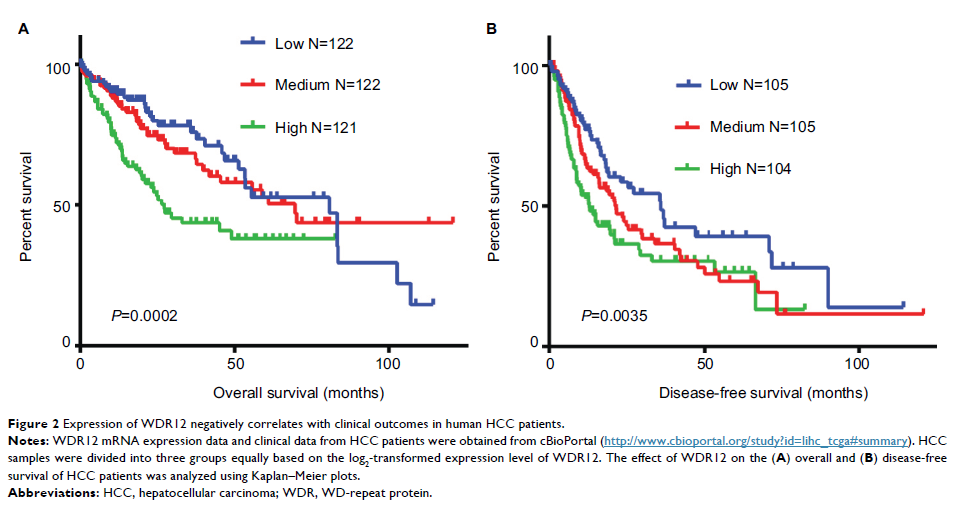108384
论文已发表
注册即可获取德孚的最新动态
IF 收录期刊
- 3.4 Breast Cancer (Dove Med Press)
- 3.2 Clin Epidemiol
- 2.6 Cancer Manag Res
- 2.9 Infect Drug Resist
- 3.7 Clin Interv Aging
- 5.1 Drug Des Dev Ther
- 3.1 Int J Chronic Obstr
- 6.6 Int J Nanomed
- 2.6 Int J Women's Health
- 2.9 Neuropsych Dis Treat
- 2.8 OncoTargets Ther
- 2.0 Patient Prefer Adher
- 2.2 Ther Clin Risk Manag
- 2.5 J Pain Res
- 3.0 Diabet Metab Synd Ob
- 3.2 Psychol Res Behav Ma
- 3.4 Nat Sci Sleep
- 1.8 Pharmgenomics Pers Med
- 2.0 Risk Manag Healthc Policy
- 4.1 J Inflamm Res
- 2.0 Int J Gen Med
- 3.4 J Hepatocell Carcinoma
- 3.0 J Asthma Allergy
- 2.2 Clin Cosmet Investig Dermatol
- 2.4 J Multidiscip Healthc

WDR12 被确定为肝细胞癌繁殖的一种新型癌基因
Authors Yin Y, Zhou L, Zhan R, Zhang Q, Li M
Received 4 June 2018
Accepted for publication 10 July 2018
Published 27 September 2018 Volume 2018:10 Pages 3985—3993
DOI https://doi.org/10.2147/CMAR.S176268
Checked for plagiarism Yes
Review by Single-blind
Peer reviewers approved by Dr Cristina Weinberg
Peer reviewer comments 2
Editor who approved publication: Professor Kenan Onel
Background: Hepatocellular carcinoma (HCC) is one of the most common malignant cancer worldwide. Importantly, the precise mechanisms causing HCC pathogenicity are still unknown. The identification of potential oncogenes plays significant roles in finding novel therapeutic targets for human HCC.
Purpose: WDR12 (WD repeat protein 12), a member of WD repeats family, plays crucial roles in the ribosome biogenesis pathway. However, Whether WDR12 contributes to HCC development remains unknown. The objective of this study was to elucidate the role of WDR12 in HCC development.
Methods: The expression level of WDR12 in HCC tissues and adjacent non-tumor tissues were detected form Gene Expression Omnibus (GEO) database. The expression level of WDR12 in HCC cell lines were examined by RT-PCR and western blot. Kaplan-Meier analysis were used to analyze the effect of WDR12 level on overall and disease-free survival of HCC patients. To examine whether WDR12 supports development of HCC, we inhibited expression of WDR12 by using an shRNA-encoding lentivirus system. Effects of WDR12 knockdown were evaluated on cell-growth, cell-proliferation and cell-migration. The mechanisms involved in HCC cells growth, proliferation and migration were analyzed by western blot assay.
Results: In silico analysis of HCC data sets showed that elevated expression of WDR12 correlated with high serum AFP level, high vascular invasion, high histologic grade and high TNM stage in HCC patients. Furthermore, up-regulated expression of WDR12 significantly correlated with the short overall survival and recurrence time of HCC patients. The shRNA-mediated knockdown of WDR12 expression resulted in reduced proliferation and migration of HepG2 and Huh-7 cells. Notably, inhibition of WDR12 resulted in decreased phosphorylation of AKT, mTOR and S6K1.
Conclusion: Our study indicates that WDR12 contributes to HCC propagation, and indicates that suppression of WDR12 may be a potential strategy for human HCC treatment.
Keywords: hepatocellular carcinoma, WD-repeat proteins, proliferation, migration
